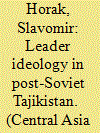| Srl | Item |
| 1 |
ID:
138246


|
|
|
|
|
| Summary/Abstract |
The Battle of Gökdepe (1881) is considered to be a turning point in Turkmenistan’s contemporary historiography. It led to the then independent Turkmen (Akhal Tekke in this case) tribes coming under Russian control. Almost immediately after the event the battle became a controversial point of interpretation starting from Turkmen sources (rarely known to us), an immense number of Russian (mostly military) sources, up to the Soviet historians. The post-Soviet official Turkmen historiography of the event came from these foundations, but used its own mythological approach. As a result, the contemporary narrative of the Gökdepe defeat turned into a victory for the Akhal Tekke (and broadly Turkmen) nation. Additionally, this paper argues that the first and partly the second presidents of Turkmenistan incorporated the battle into their own personality cults, a fact which is still specific to the Central Asian context, albeit not unique in world history. In particular, the first president usurped the myth and connected it with his own historical narrative. The second president continues this in the frames of the already settled political culture in the country, adapting the Gökdepe myth to create his own ideological story. Therefore, the appropriation of the historical event in Turkmenistan represents a specific (albeit not unique) case of this kind and shows the way of thinking about the leader in current Turkmenistan.
|
|
|
|
|
|
|
|
|
|
|
|
|
|
|
|
| 2 |
ID:
095169


|
|
|
|
|
| Publication |
2009.
|
| Summary/Abstract |
Ideology is one of the foundations of authoritative regimes and forms the image of their leaders. Using Uzbekistan as an example, A. March comes to the conclusion that the ideological system imposed by the state has a tangible impact on society, even one that has already lived at one time under the communist ideology. Based on an analysis of several special features of the development of the post-Communist countries (and several others), the conclusion is drawn that during a political regime change, the population can be ideologically "reset." After a new ideology has been repeatedly fed to the people over the span of several years, it becomes a conscious or subconscious element of society's mindset. Thus ideology plays a significant role in state- and nation-building, particular after the formation of new states or territorial units.
|
|
|
|
|
|
|
|
|
|
|
|
|
|
|
|